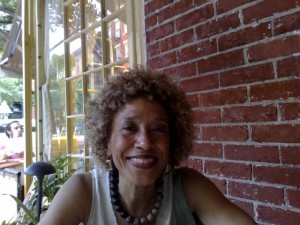 Renowned critic and nonfiction writer Margo Jefferson will take the FPP Harlem stage at AWP in Boston this Friday, March 8, 2013 with Justin Torres and Keya Mitra. We talk to her about her about separating the personal from “bigger things” and pursuing another kind of authority. Come hear her @ 3:00 pm. Room 110, Plaza Level. F229.
Renowned critic and nonfiction writer Margo Jefferson will take the FPP Harlem stage at AWP in Boston this Friday, March 8, 2013 with Justin Torres and Keya Mitra. We talk to her about her about separating the personal from “bigger things” and pursuing another kind of authority. Come hear her @ 3:00 pm. Room 110, Plaza Level. F229.
What emotional concerns are you pursuing in your current project? What emotional concerns appear to be pursuing you? How does a self worth selfdom emerge from family, history, biology? What were, what are its needs, its demands its punishments and rewards? How do selves get revised & remapped?
How have you navigated the challenge of writing a personal history that reveals your own misperceptions about access to privilege? Make that present tense, i.e. still navigating. Always trying to see the personal apart from yet part of these bigger things: my cultural, social political surroundings, then and now. Trying to take responsibility, look clinically at my own temperament, so I don’t shift everything onto history.
In your own work how have you interpreted the relationship between the essay and the play or the genres of nonfiction and drama? Do you think the essay is intrinsically performative? It seems to me that I always have dialogue going on, at least implicitly; tensions between my own voices or ideas, between (I hope) voices and rhythms. I try to stage not just scenes, but analysis and reflection.
If the essay is intrinsically performative, do you think the process of writing essays function as an act of masking? I have spent years writing criticism. Everyone knows that critical essays are acts of masking. That mask tends to encourage or enforce a sense of accomplished coherence. But every essayist is working, playing with personae, and a persona is always a mask. It’s a question of what mask, what theatrical style you choose for your subject and, crucially for your audience – or audiences – as you imagine or court them.
Do you see any relevant comparisons between music and the essay? What are the harmonic relations between narrative, meditation, confession, and such? Again, what kinds of rhythms serve what ends? And if your voice is the melody or a series of melodies, how much room for variation, the appearance of improvisation is there?
Colson Whitehead once said in an interview, “being depressed in New York can seem like the end of the world.” What can seem like the end of the world to you and how does that manifest in your writing? A kind of hopelessness – Elizabeth Bishop once wrote in an essay, “Why was I born a human being?” When that overtakes me, the end of the world seems wished for. In my current project, it shows up in a rhythm and attitude of grim terseness. And sometimes in silence.
What about a piece of writing makes it experimental? (Does this change when the piece is written by a woman and/or person of color?) Well, (gulp), to be grossly simple, a piece of “experimental writing” seems to be giving form and content some fresh, surprising relation to each other. But in whose eyes? Who’s surprised by what? Experimentalists tend to have a very clear, fixed sense of the enemy, i.e. traditions, conventions, writing that constricts & falsifies. The landscape gets much trickier with women, people of color and other historically besieged groups. It’s the weight of expectations about our histories, our competencies, our preferred modes of expression (or those others feel should be our preferred modes)). And these expectations can come from everywhere: from standard “traditionalists” and standard “experimentalists”; from other women and other people of color…So what looks, smells, feels experimental keeps changing, It’s varied and mutable. Fugitive.
Though you have lived in New York for many years, you frequently travel to Chicago. What relationship, if any, do you see between the two cities? Chicago invented me. I revise myself in New York.
After a major work or life event, writers often declare a need to reinvent their work. Have you experienced this preoccupation? How have you dealt with it? For years I did a kind of traditional “authoritative” criticism for magazines and newspapers. I’m after different kinds of authority now. Ambivalence, ambiguity, vulnerability.
What amazes you? Fearlessness.
